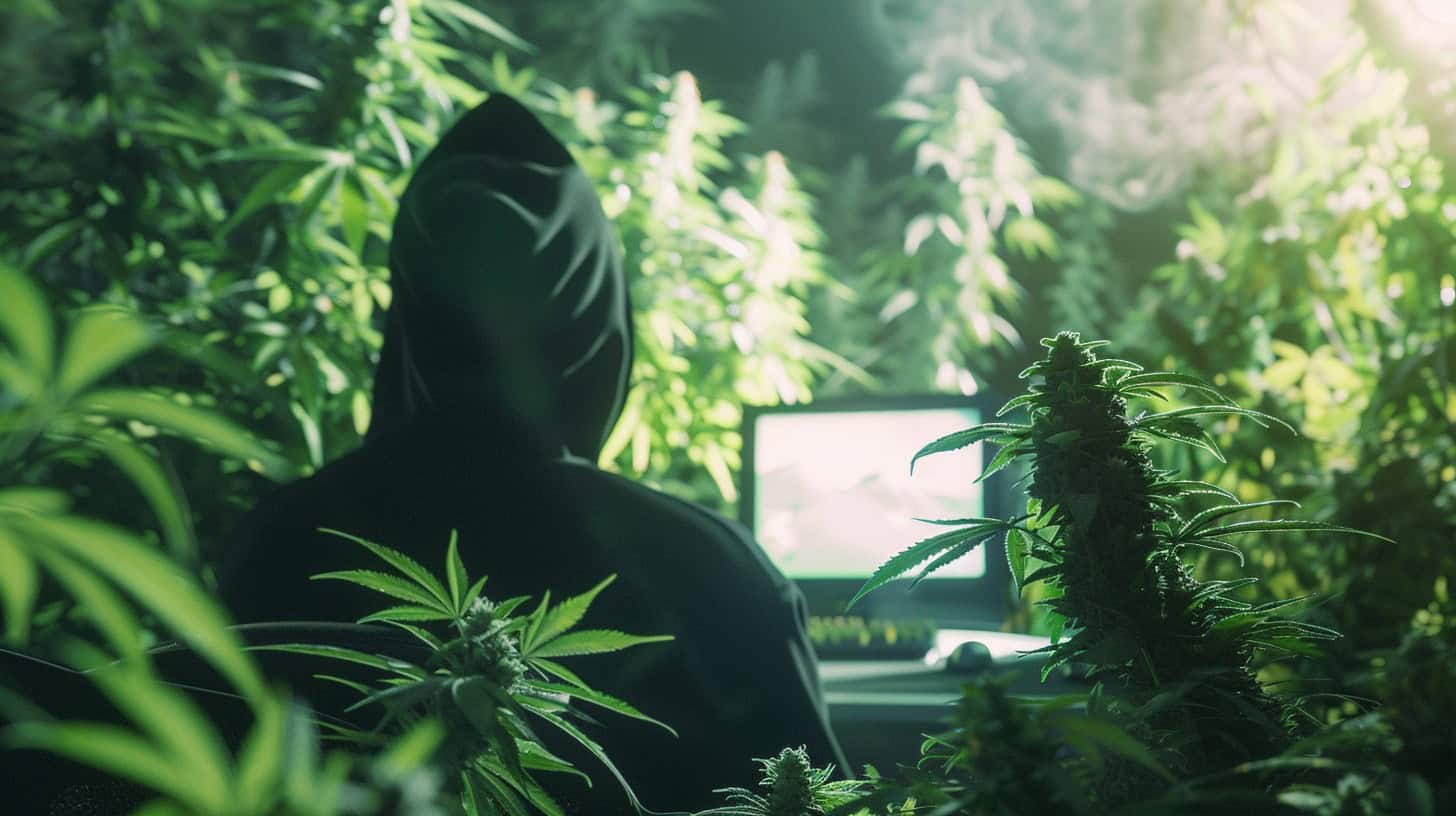Gaming and cannabis can be a perfect match. But choosing the right strain matters. Sativa strains boost focus and energy, while indica strains promote relaxation. 2 This guide reveals the best cannabis varieties for different game types.
As a long-time gamer and cannabis enthusiast, I’ve tested countless strains to enhance gameplay. I’ll share my top picks for strategy, action, and puzzle games. You’ll discover how to level up your gaming experience with the ideal cannabis strain.
Ready to unlock your full gaming potential?
Key Takeaways
Sativa strains boost focus and energy for gaming, while indica strains promote relaxation and calm.
Top sativa strains for gaming include Green Crack, Jack Herer, and Durban Poison, with THC levels of 15-24%.
Popular indica strains for gamers are Hindu Kush, OG Kush (17-21% THC), and Granddaddy Purple.
Hybrid strains like Blue Dream (14-20% THC) and Wedding Cake (up to 24% THC) offer a mix of focus and relaxation.
Different game types work best with specific strains – sativas for strategy games, indicas for puzzles, and hybrids for action games.
Table of Contents
Overview of Sativa and Indica Strains

Cannabis comes in two main types: Sativa and Indica. According to GanjaFarmer, these strains offer different effects on the body and mind, impacting your gaming experience.
Sativa Strain Traits
Sativa strains grow tall and lean, with narrow leaves. These plants, which grows from marijuana seeds (like these, for example: https://ganjafarmer.com), typically contain high levels of THC – ranging from 12% to 28%. 1 Sativas produce an energizing, cerebral effect that boosts creativity and focus. 2
Sativas are like a cup of coffee for your brain. – Anonymous cannabis enthusiast
Users report enhanced mental clarity and improved problem-solving abilities with sativa use. Popular strains include Green Crack, Durban Poison, and Jack Herer – known for their uplifting and stimulating effects.
You can further elevate your experience by using a roll coating machine to evenly coat your kief covered pre roll with cannabis concentrates, offering a more potent and consistent high that amplifies the effects of your favorite sativa strains.
Gamers often prefer sativas for their ability to sharpen reaction times and increase alertness during gameplay.
Indica Strain Traits
Moving from Sativa’s energizing effects, Indica strains offer a different experience for gamers. Indica-dominant varieties produce deep relaxation and a sense of calm. These strains, like Hindu Kush and Critical Mass, create a mellow, thoughtful gaming atmosphere.
Indica’s sedative properties make it ideal for evening sessions or laid-back gameplay. 2
Pure Indica strains are rare in today’s market. Most available options are hybrids with Indica-dominant traits. These plants typically contain higher levels of CBD, promoting pain relief and stress reduction.
Gamers often choose Indica strains to unwind after intense gaming sessions or to enhance immersion in story-driven games. 3
Benefits of Sativa Strains for Gaming

Sativa strains boost focus and energy for gaming. They sharpen senses and spark creativity, perfect for long sessions.
Enhance Focus and Energy
Sativa-dominant strains boost mental clarity and energy for gaming. They activate brain receptors, sharpening focus and reaction time. Sour Diesel, a popular choice, energizes players for fast-paced action games. 4 Blue Dream offers a balanced mix of relaxation and concentration, ideal for strategy games.
Sativa strains are like a performance enhancer for your gaming skills – they keep you sharp, alert, and ready to react.
Jack Haze stimulates creativity, perfect for puzzle-solving in Minecraft or Tetris. These strains’ effects stem from their unique terpene profiles and cannabinoid ratios. Gamers report improved performance and longer, more enjoyable gaming sessions with sativa use. 5
Top Sativa Strains for Gamers
Enhancing focus and energy is crucial for gaming. Here are top sativa strains that elevate gameplay:
- Green Crack: Sharpens focus, boosts mental clarity. Perfect for strategy games requiring quick decision-making. 6
- Jack Herer: Sparks creativity, ideal for puzzle-based games like Minecraft or Tetris. THC levels range from 15-24%. 6
- Durban Poison: Increases alertness and concentration. Great for action-packed games demanding fast reflexes.
- Sour Diesel: Improves problem-solving skills. Excellent for complex RPGs or adventure games.
- Super Silver Haze: Enhances creativity and mental agility. Suitable for open-world games with multiple objectives.
- Blue Dream (14-20% THC): Induces mellow tranquility while maintaining focus. Good for long gaming sessions.
- Jack Haze: Boosts creative thinking. Ideal for games requiring innovative solutions or world-building. 7
Benefits of Indica Strains for Gaming

Indica strains offer gamers a chill, relaxed vibe. They help you unwind and ease into your gaming session.
Promote Relaxation and Calm
Indica strains excel at promoting relaxation and calm during gaming sessions. They induce a soothing body high, easing tension and creating a peaceful mindset. Gamers often turn to indica-dominant varieties for their sedative effects, perfect for winding down after intense gameplay. 6
Granddaddy Purple and Cereal Milk stand out as top choices for relaxed gaming experiences. These strains offer a tranquil euphoria, enhancing immersion in slower-paced or story-driven games.
Hindu Kush delivers peaceful bliss, ideal for racing games like DIRT 5 or Forza Horizon 4. Indica’s calming properties help gamers stay cool under pressure and enjoy their virtual adventures fully. 5
Top Indica Strains for Gamers
Indica strains offer relaxation and calm, perfect for gamers seeking stress relief. Here are top indica strains tailored for gaming enthusiasts:
- Hindu Kush: Delivers peaceful euphoria, ideal for strategy games requiring deep thought.
- Critical Mass: Provides a mellow body high, great for games needing mental clarity and focus.
- OG Kush: With 17-21% THC, induces relaxation and mental clarity, enhancing sociability for multiplayer games. 7
- Granddaddy Purple: Offers full-body relaxation, perfect for immersive RPGs.
- Northern Lights: Promotes deep relaxation and stress relief, suitable for puzzle games. 8
Hybrid Strains and Their Gaming Advantages

Hybrid strains mix sativa and indica effects for a balanced gaming experience. They offer focus and relaxation, perfect for long gaming sessions.
Combine Focus and Relaxation
Hybrid strains offer gamers a sweet spot between focus and relaxation. Dream in Blue and Original Kush stand out as top picks for this balanced experience. These strains blend the best of both worlds – sharpening mental acuity while easing tension.
Gamers report enhanced immersion and enjoyment across various game types with these hybrids. 10Blue Dream and Jack Haze excel at boosting concentration and creativity. For intense strategy sessions or puzzle-solving, these strains can spark innovative thinking. Hindu Kush delivers a calming euphoria, perfect for unwinding with casual games or story-driven adventures.
The right strain choice depends on your gaming goals and preferred experience. 9
Top Hybrid Strains for Gamers
Combining focus and relaxation leads us to explore top hybrid strains for gamers. These strains offer a balanced experience, perfect for different gaming scenarios. 5
- Blue Dream: THC content 14-20%. Mellow tranquility suits novice users. Enhances creativity for strategy games.
- Wedding Cake (Pink Cookies): Up to 24% THC. Boosts focus for action-packed gaming sessions. Also known as Triangle Mints #23.
- OG Kush: Indica-dominant hybrid. Sedative effects help with long gaming marathons. Reduces stress during competitive play. 7
- Sundae Driver: Approximately 21% THC. Balances mental clarity with physical relaxation. Ideal for puzzle games and problem-solving.
Selecting the Ideal Strain for Game Types
Different games call for different strains. Strategy games mesh well with focus-boosting sativas, while relaxing indicas suit puzzle games.
Strategy Game Choices
Strategy games demand focus and creativity. Certain cannabis strains can enhance these qualities for gamers.
- Blue Dream: This hybrid strain offers a perfect balance for strategy gaming. It provides relaxation to ease stress, while maintaining mental alertness for complex decision-making. Blue Dream is ideal for extended sessions of games like Civilization or Starcraft. 5
- Jack Haze: This sativa-dominant strain boosts creativity and energy. It’s excellent for games requiring innovative thinking and quick reactions. Jack Haze can improve performance in fast-paced strategy titles like Age of Empires or Command & Conquer.
- Green Crack: Known for its intense focus-enhancing effects, Green Crack helps gamers stay “in the zone” for hours. It’s particularly useful for detail-oriented strategy games like Europa Universalis or Crusader Kings.
- Durban Poison: This pure sativa strain increases alertness and concentration. Durban Poison can sharpen a player’s tactical thinking in games like XCOM or Into the Breach. 9
- Super Silver Haze: Offering a cerebral high, this strain enhances problem-solving skills. It’s beneficial for puzzle-strategy hybrids like Portal or The Witness.
Action games require different strains to match their fast-paced nature.
Action Game Choices
Moving from strategy games to action-packed experiences, strain selection shifts gears. Action games demand quick reflexes and heightened sensory awareness, making certain cannabis varieties more suitable.
White Widow – This sativa-dominant hybrid provides a “turbo boost” for gaming. It enhances focus and promotes a state of flow, ideal for high-energy POV action games like Call of Duty. 4Limonene-rich strains – Cannabis varieties high in this terpene boost concentration. They’re perfect for fast-paced, demanding games that require split-second decisions. 7Pinene-dominant options – Strains with high pinene content sharpen mental clarity. These work well for action games with complex mechanics or intricate level designs. 7HHC-O White Widow vape cartridge – This product offers a balanced blend of euphoria and focus. It’s recommended for extended gaming sessions that require sustained attention.
Sativa-leaning hybrids – These strains combine energy boost with mild relaxation. They’re suited for action-adventure games that mix intense combat with exploration phases.
Puzzle Game Choices
Action games require quick reflexes, but puzzle games demand a different kind of mental agility. For puzzle enthusiasts, certain cannabis strains can enhance problem-solving skills and boost creativity.
- Jack Haze: This sativa strain sparks imagination, perfect for Minecraft or Tetris. Its cerebral effects heighten focus, crucial for complex puzzles. 9
- Lemon Haze: A sativa-dominant hybrid that sharpens concentration. Its citrusy terpene profile, rich in limonene, aids in maintaining alertness during extended gaming sessions. 7
- Cereal Milk: This balanced hybrid offers a mix of focus and relaxation. It’s ideal for games that require both logical thinking and creative solutions.
- Sour Diesel: A popular sativa that energizes the mind. Its uplifting effects can help gamers tackle challenging puzzles with renewed vigor.
- Blue Dream: This hybrid strain provides a calm focus. It’s excellent for games that require patience and methodical thinking.
- Green Crack: Despite its name, this sativa strain offers clean, focused energy. It’s great for fast-paced puzzle games that test reaction time.
- Durban Poison: A pure sativa that enhances mental clarity. It’s perfect for strategy-based puzzle games that require long-term planning.
People Also Ask
Is indica or sativa better for casual gaming?
Indica strains may be better for relaxed, casual gaming sessions. They can enhance focus on puzzle games and create a chill vibe.
How does sativa affect video game performance?
Sativa strains often boost energy and creativity. They may improve reaction times in fast-paced games.
What’s the ideal cannabis dosage for gaming?
Start with 5mg THC for new users. Experienced users may prefer 10-15mg for gaming sessions.
Can mixing strains improve the gaming experience?
Combining indica and sativa can create an “entourage effect”. This may balance relaxation and focus for optimal gaming.
Are there risks to using cannabis while gaming?
Overuse can impair coordination and reaction time. It may affect short-term memory needed for complex games.
References
- ^ https://www.ncbi.nlm.nih.gov/pmc/articles/PMC5576603/
- ^ https://www.healthline.com/health/sativa-vs-indica
- ^ https://risecannabis.com/cannabis-101/indica-vs-sativa/
- ^ https://gopackstation.com/blogs/cannabis-related/cannabis-and-gaming-the-best-strains-for-gamers
- ^ https://thewarehousecannabis.com/what-are-the-best-cannabis-strains-for-gaming-top-marijuana-products-for-gamers/ (2024-01-26)
- ^ https://hyperwolf.com/w/best-gaming-weed-strains/ (2023-08-30)
- ^ https://herb.co/guides/strain-sense-best-strains-for-playing-video-games
- ^ https://www.royalqueenseeds.com/us/blog-the-best-weed-strains-for-gaming-n1622 (2024-05-27)
- ^ https://d8superstore.com/sativa-or-indica-for-gaming
- ^ https://www.vibebycalifornia.com/the-perfect-combo-merging-cannabis-and-video-games-for-an-elevated-adventure-2/ (2024-04-22)



